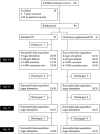Glutamine supplementation of parenteral nutrition does not improve intestinal permeability, nitrogen balance, or outcome in newborns and infants undergoing digestive-tract surgery: results from a double-blind, randomized, controlled trial
- PMID: 15798461
- PMCID: PMC1357063
- DOI: 10.1097/01.sla.0000157270.24991.71
Glutamine supplementation of parenteral nutrition does not improve intestinal permeability, nitrogen balance, or outcome in newborns and infants undergoing digestive-tract surgery: results from a double-blind, randomized, controlled trial
Abstract
Objective: To assess the effect of isocaloric isonitrogenous parenteral glutamine supplementation on intestinal permeability and nitrogen loss in newborns and infants after major digestive-tract surgery.
Summary background data: Glutamine supplementation in critically ill and surgical adults may normalize intestinal permeability, attenuate nitrogen loss, improve survival, and lower the incidence of nosocomial infections. Previous studies in critically ill children were limited to very-low-birthweight infants and had equivocal results.
Methods: Eighty newborns and infants were included in a double-blind, randomized trial comparing standard parenteral nutrition (sPN; n = 39) to glutamine-supplemented parenteral nutrition (GlnPN; glutamine target intake, 0.4 g kg day; n = 41), starting on day 2 after major digestive-tract surgery. Primary endpoints were intestinal permeability, as assessed by the urinary excretion ratio of lactulose and rhamnose (weeks 1 through 4); nitrogen balance (days 4 through 6), and urinary 3-methylhistidine excretion (day 5). Secondary endpoints were mortality, length of stay in the ICU and the hospital, number of septic episodes, and usage of antibiotics and ICU resources.
Results: Glutamine intake plateaued at 90% of the target on day 4. No differences were found between patients assigned sPN and patients assigned GlnPN regarding any of the endpoints. Glutamine supplementation was not associated with adverse effects.
Conclusions: In newborns and infants after major digestive-tract surgery, we did not identify beneficial effects of isonitrogenous, isocaloric glutamine supplementation of parenteral nutrition. Glutamine supplementation in these patients therefore is not warranted until further research proves otherwise.
Figures



Similar articles
-
Randomized clinical trial of glutamine-supplemented versus standard parenteral nutrition in infants with surgical gastrointestinal disease.Br J Surg. 2012 Jul;99(7):929-38. doi: 10.1002/bjs.8750. Epub 2012 Apr 19. Br J Surg. 2012. PMID: 22513659 Clinical Trial.
-
Glutamine supplementation in infants with gastrointestinal disease: a randomized, placebo-controlled pilot trial.Nutrition. 2004 Sep;20(9):752-6. doi: 10.1016/j.nut.2004.05.013. Nutrition. 2004. PMID: 15325681 Clinical Trial.
-
Clinical and metabolic efficacy of glutamine-supplemented parenteral nutrition after bone marrow transplantation. A randomized, double-blind, controlled study.Ann Intern Med. 1992 May 15;116(10):821-8. doi: 10.7326/0003-4819-116-10-821. Ann Intern Med. 1992. PMID: 1567096 Clinical Trial.
-
Glutamine dipeptide-supplemented parenteral nutrition improves the clinical outcomes of critically ill patients: A systematic evaluation of randomised controlled trials.Clin Nutr ESPEN. 2017 Feb;17:75-85. doi: 10.1016/j.clnesp.2016.09.007. Epub 2016 Oct 27. Clin Nutr ESPEN. 2017. PMID: 28361751 Review.
-
[Guidelines for specialized nutritional and metabolic support in the critically-ill patient. Update. Consensus of the Spanish Society of Intensive Care Medicine and Coronary Units-Spanish Society of Parenteral and Enteral Nutrition (SEMICYUC-SENPE): gastrointestinal surgery].Med Intensiva. 2011 Nov;35 Suppl 1:42-7. doi: 10.1016/S0210-5691(11)70009-2. Med Intensiva. 2011. PMID: 22309752 Spanish.
Cited by
-
Surgery and transplantation - Guidelines on Parenteral Nutrition, Chapter 18.Ger Med Sci. 2009 Nov 18;7:Doc10. doi: 10.3205/000069. Ger Med Sci. 2009. PMID: 20049072 Free PMC article. Review.
-
Glutamine randomized studies in early life: the unsolved riddle of experimental and clinical studies.Clin Dev Immunol. 2012;2012:749189. doi: 10.1155/2012/749189. Epub 2012 Sep 18. Clin Dev Immunol. 2012. PMID: 23019424 Free PMC article. Review.
-
Intestinal Barrier Maturation in Very Low Birthweight Infants: Relationship to Feeding and Antibiotic Exposure.J Pediatr. 2017 Apr;183:31-36.e1. doi: 10.1016/j.jpeds.2017.01.013. Epub 2017 Jan 31. J Pediatr. 2017. PMID: 28159311 Free PMC article.
-
Efficacy of parenteral nutrition supplemented with glutamine dipeptide to decrease hospital infections in critically ill surgical patients.JPEN J Parenter Enteral Nutr. 2008 Jul-Aug;32(4):389-402. doi: 10.1177/0148607108317880. Epub 2008 Jun 9. JPEN J Parenter Enteral Nutr. 2008. PMID: 18596310 Free PMC article. Clinical Trial.
-
Providing the Best Parenteral Nutrition before and after Surgery for NEC: Macro and Micronutrients Intakes.Nutrients. 2022 Feb 22;14(5):919. doi: 10.3390/nu14050919. Nutrients. 2022. PMID: 35267894 Free PMC article. Review.
References
-
- Novak F, Heyland DK, Avenell A, et al. Glutamine supplementation in serious illness: a systematic review of the evidence. Crit Care Med. 2002;30:2022–2029. - PubMed
-
- Stehle P, Zander J, Mertes N, et al. Effect of parenteral glutamine peptide supplements on muscle glutamine loss and nitrogen balance after major surgery. Lancet. 1989;1:231–233. - PubMed
-
- Ziegler TR, Young LS, Benfell K, et al. Clinical and metabolic efficacy of glutamine-supplemented parenteral nutrition after bone marrow transplantation. Ann Intern Med. 1992;116:821–828. - PubMed
-
- van der Hulst RRWJ, van Kreel BK, von Meyenfeldt MF, et al. Glutamine and the preservation of gut integrity. Lancet. 1993;341:1363–1365. - PubMed
-
- Karwowska KA, Dworacki G, Trybus M, et al. Influence of glutamine-enriched parenteral nutrition on nitrogen balance and immunologic status in patients undergoing elective aortic aneurysm repair. Nutrition. 2001;17:475–478. - PubMed
Publication types
MeSH terms
Substances
LinkOut - more resources
Full Text Sources
Medical

